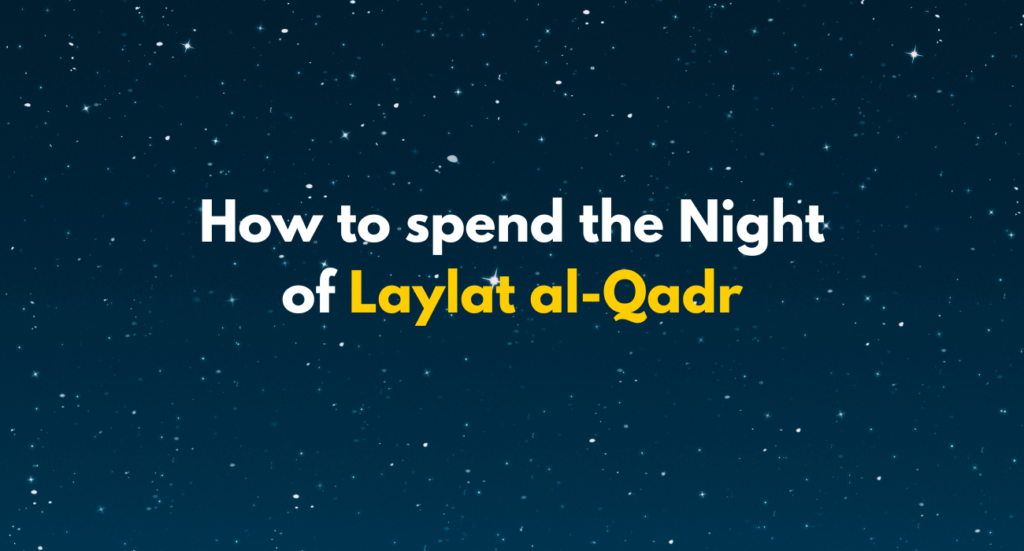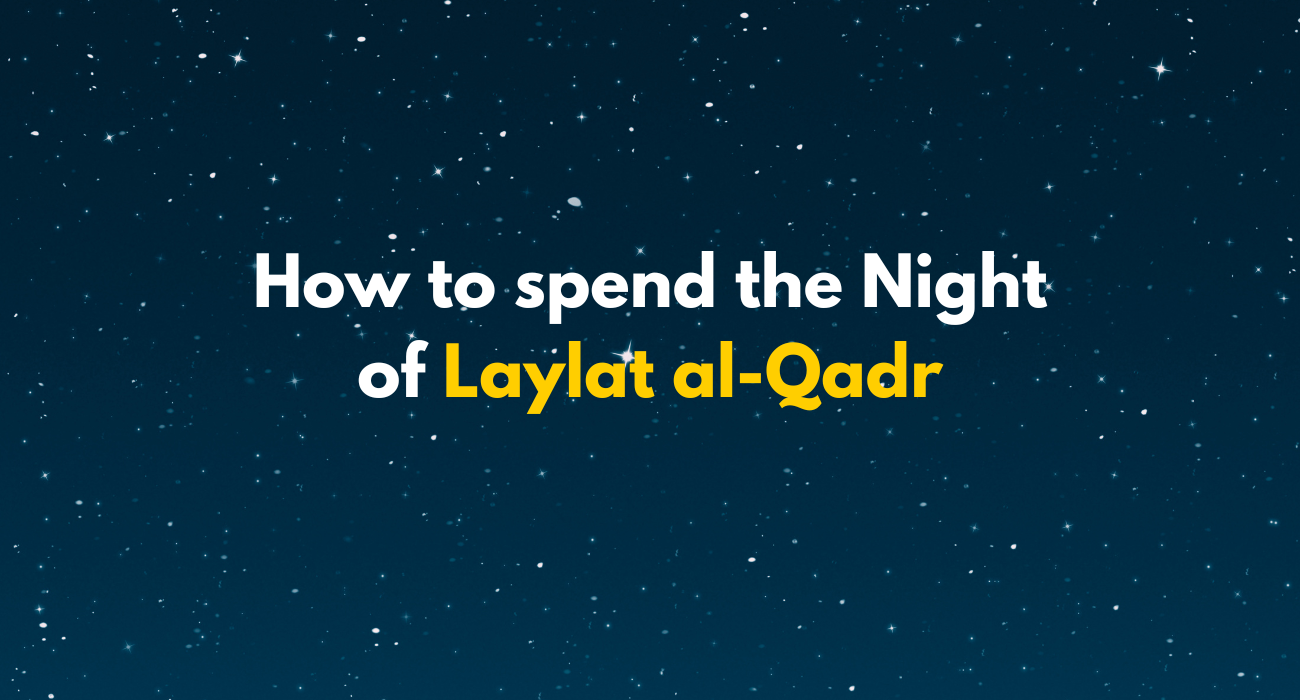How to spend the Night of Laylat al-Qadr
How to spend the Night of Laylat al-Qadr: In the serene embrace of the holy month of Ramadan, there exists a night so profound, so celestial, that its essence transcends time itself. It is a night whispered about in hushed tones, adorned with the fragrance of prayers and illuminated by the radiance of faith. This is the Night of Laylat al-Qadr, a night of unparalleled significance in the Islam.

As the sun dips below the horizon and the world settles into the tranquil embrace of the night, believers across the globe turn their hearts towards the heavens, seeking the blessings and mercy of their Creator. For within the folds of this blessed night lies a treasure beyond measure – the revelation of the Quran. In this blog post you will understand How to spend the Night of Laylat al-Qadr so that you can utilize it to the fullest.
Importance of Laylat al-Qadr :
Laylat al-Qadr, often transliterated as “Laylatul Qadr,” is an Arabic term that translates to “The Night of Power” or “The Night of Decree” in English. It is one of the most significant nights in Islam, revered for its immense spiritual significance and blessings. Laylat al-Qadr is believed to be the night when the first verses of the Quran were revealed to the Prophet Muhammad (peace be upon him) by the angel Gabriel. It is mentioned in the Quran in Surah Al-Qadr (Chapter 97), where Allah says:
“In the name of Allah, the Most Gracious, the Most Merciful. Indeed, We sent the Qur’an down during the Night of Decree. And what can make you know what is the Night of Decree? The Night of Decree is better than a thousand months. The angels and the Spirit descend therein by permission of their Lord for every matter. Peace it is until the emergence of dawn.” (Quran, 97:1-5)
The exact date of Laylat al-Qadr is not specified in the Quran, but it is widely believed to occur during one of the last ten nights of Ramadan, with particular emphasis on the odd nights, such as the 21st, 23rd, 25th, 27th, or 29th night of the month. But it’s debatable. Muslims believe that Laylat al-Qadr is a night of immense blessings, mercy, and forgiveness. It is a time when the gates of heaven are open, and prayers are more readily accepted. Muslims engage in various acts of worship during this night, including recitation of the Quran, performing extra prayers (Tahajjud), making heartfelt supplications (dua), and seeking forgiveness for past sins.
The virtues of Laylat al-Qadr are emphasized in Islamic teachings, encouraging believers to dedicate themselves to worship and good deeds during the last ten nights of Ramadan, in search of this blessed night. Many Muslims spend these nights in seclusion, deep prayer, and reflection, striving to attain closeness to Allah and draw spiritual benefits from this auspicious occasion.
How to spend the Night of Laylat al-Qadr:
As the holy month of Ramadan draws to a close, Muslims around the world eagerly anticipate the arrival of Laylat al-Qadr, the Night of Decree. This sacred night, believed to be when the Quran was first revealed, holds immense spiritual significance and blessings. Here are some ways on How to spend the Night of Laylat al-Qadr in worship and devotion:
- Salah and Voluntary Prayers: Salah, the obligatory prayers in Islam, form the cornerstone of a Muslim’s spiritual practice. Laylatul Qadr serves as a timely reminder to prioritize and strengthen our connection with Salah. Additionally, engaging in voluntary prayers (nafl) during this blessed night is highly rewarding. Each act of worship performed on Laylatul Qadr is multiplied manifold, offering a unique opportunity for spiritual growth and closeness to Allah.
- Making Du’a (Supplication): Laylatul Qadr presents an ideal moment to pour out our hearts in sincere supplication to Allah. Beyond seeking personal blessings, it is essential to remember our fellow Muslims facing adversity worldwide. Through heartfelt prayers, we invoke Allah’s mercy and guidance for all those in need, reflecting the spirit of compassion and solidarity that Islam promotes.
- Tawbah (Repentance): Laylatul Qadr is a night of forgiveness and mercy, offering believers a chance to repent for their past transgressions. Following the example of the Prophet Muhammad (peace be upon him), we seek Allah’s forgiveness with sincerity, acknowledging our faults and committing to positive change. By turning to Allah in repentance, we strive to cleanse our hearts and renew our commitment to righteousness.
- Acts of Sadaqah (Charity): Giving charity holds immense virtue in Islam, particularly during the blessed month of Ramadan. Laylatul Qadr amplifies the rewards of charitable deeds, making it an opportune time to support those in need. Whether through financial contributions, acts of kindness, or volunteering efforts, every act of charity performed on this night carries immense significance in the eyes of Allah.
- Reading Quran: Reading the Quran holds immense significance on Laylatul Qadr, as it is the night when the Quran was first revealed to Prophet Muhammad (peace be upon him). Muslims are encouraged to devote themselves to the recitation and reflection of the Quran during this blessed night. By engaging in the recitation of the Quran, believers not only fulfil a fundamental act of worship but also connect with the divine message and guidance bestowed upon humanity.The Quran serves as a source of guidance, wisdom, and solace for Muslims, and Laylatul Qadr provides a unique opportunity to deepen one’s relationship with the Quran. Reciting its verses, pondering over its meanings, and internalizing its teachings enable believers to draw closer to Allah and attain spiritual enlightenment.
Moreover, the rewards for reciting the Quran on Laylatul Qadr are multiplied manifold, as Allah’s mercy descends abundantly upon those who engage in acts of worship on this blessed night. Therefore, Muslims are encouraged to dedicate ample time to reading, understanding, and contemplating the Quran during Laylatul Qadr, seeking blessings, guidance, and divine favor in their lives.
Beyond acts of worship, Laylatul Qadr reminds us of the importance of embodying virtuous qualities in our interactions with others. Upholding good manners, practicing generosity, and cultivating humility are integral aspects of Islamic ethics. By striving for excellence in character, we emulate the teachings of the Prophet Muhammad (peace be upon him) and draw closer to Allah’s pleasure.
How to Pray on Laylatul Qadr?
As the blessed Night of Decree, Laylatul Qadr, approaches, Muslims eagerly seek ways to maximize the spiritual benefits of this auspicious occasion. According to the Sunnah of the Prophet Muhammad (peace be upon him), there are two fundamental practices to observe on Laylatul Qadr:
- Stand in Prayer before Allah:The method of prayer on Laylatul Qadr is not rigidly defined, allowing flexibility for individual worship. However, it is recommended to follow these general guidelines:
- Begin by making a sincere intention in your heart to pray two Rakat of Nafl Salah specifically for Laylatul Qadr.
- Perform the prayer in sets of two Rakat, adhering to the Sunnah of night prayers. Repeat as desired throughout the night.
- Focus on the quality of your prayer rather than the quantity of Rakats. Lengthen each Rakah by reciting longer Surahs, fostering a deeper connection with Allah.
- If you are participating in I’tikaf (spiritual seclusion) at a mosque, join the congregation for prayer led by an Imam during the Qiyam-ul-Layl (night prayer) portion.
- Prior to the Fajr prayer, conclude your worship by performing Witr prayer to make the total number of Rakats odd.
- Making Dua to Allah:Alongside prayer, Laylatul Qadr is a prime opportunity to engage in heartfelt supplication to Allah. Seek His forgiveness, mercy, and guidance for yourself, your loved ones, and the entire Muslim community. Remember those who are suffering or oppressed, and pray for relief from hardship and for peace and prosperity for all humanity.
FAQ about Laylat al-Qadr
Q. Is Laylatul Qadr in Ramadan?
Ans. Absolutely. Laylatul Qadr falls within the blessed month of Ramadan. This certainty stems from the Quranic revelation, where Allah mentions the descent of the Quran on the Night of Decree (Surah al-Qadr: 1) and specifies Ramadan as the month of revelation (Surah al-Baqarah: 185). Hence, combining these verses confirms Laylatul Qadr’s occurrence within the month of Ramadan, a fact reinforced by the teachings of the Prophet Muhammad (peace be upon him).
Q. Was the Quran revealed on Laylatul Qadr?
Ans. Indeed. Laylatul Qadr marks the night of the Quran’s revelation, as indicated in the Quran (Surah al-Qadr: 1).
Q. Can Laylatul Qadr change destiny?
Ans. Laylatul Qadr holds profound significance as a night when Allah decrees the events of the coming year. Angels descend to implement these decrees, underscoring the pivotal role of Laylatul Qadr in determining destiny. Believers are encouraged to seize this opportunity for repentance, supplication, and seeking Allah’s mercy, recognizing the transformative power of this blessed night in shaping their destinies for the year ahead.
Q. How many Rakats in Laylatul Qadr?
Ans. Laylatul Qadr’s worship involves performing Nafl Salah in sets of two Rakats, with no specified limit. It’s recommended to engage in prolonged prayer, focusing on quality over quantity. Muslims are encouraged to immerse themselves in worship throughout the night, seeking closeness to Allah and maximizing the blessings of Laylatul Qadr through devotion and supplication.
Q. Was the Quran revealed on the 27th of Ramadan?
Ans. While some opinions suggest the 27th night of Ramadan as potentially being Laylatul Qadr, scholars affirm that Laylatul Qadr can occur on any of the odd nights during the last ten days of Ramadan. Thus, while the 27th night holds significance, Laylatul Qadr’s exact date remains known only to Allah. Muslims are urged to intensify their worship and spiritual efforts during the last ten nights of Ramadan, particularly on the odd nights, in anticipation of Laylatul Qadr. Laylatul Qadr’s exact date remains known only to Allah.
Q. Why is the 27th night of Ramadan significant?
Ans. The 27th night of Ramadan, being one of the odd nights during the last ten days, is highly esteemed for its potential to be Laylatul Qadr. Additionally, historical emphasis by some Sahaba (companions of the Prophet) and scholars on this night underscores its significance.
Q. Can menstruating women observe Laylatul Qadr?
Ans. While menstruating women cannot engage in prayer during Laylatul Qadr, they are encouraged to participate through Dhikr (remembrance of Allah) and Duas (supplications). Additionally, they can offer charity and facilitate the worship of their family members.
Q. Is Laylatul Qadr the same for everyone around the world?
Ans. Laylatul Qadr occurs on the same night globally; however, variations in geographical locations result in differences in odd nights and timings. Despite these differences, the spiritual significance of Laylatul Qadr remains universal, known and ordained by Allah alone.
Conclusion
Laylat al-Qadr stands as a pinnacle of spiritual significance within the Islamic faith, offering believers a profound opportunity for worship, reflection, and supplication. Firmly rooted in the Quranic revelation and the Sunnah of the Prophet Muhammad (peace be upon him), Laylatul Qadr embodies the mercy, guidance, and divine favor bestowed upon humanity. As Muslims strive to observe this blessed night with devotion and sincerity, they are reminded of the transformative power of faith, repentance, and prayer in shaping their destinies. While the exact date of Laylatul Qadr remains concealed, its universal significance transcends geographical boundaries, uniting believers worldwide in the pursuit of divine blessings and forgiveness.
As the final nights of Ramadan approach, Muslims are encouraged to intensify their worship and spiritual efforts, seeking Laylatul Qadr with unwavering dedication and humility. Through acts of charity, remembrance, and supplication, believers endeavor to draw closer to Allah and embody the teachings of compassion, generosity, and righteousness exemplified by the Prophet Muhammad (peace be upon him). May the blessings of Laylatul Qadr illuminate our hearts and lives, guiding us towards piety, righteousness, and eternal bliss. Aameen

1 thought on “How to spend the Night of Laylat al-Qadr”
Comments are closed.